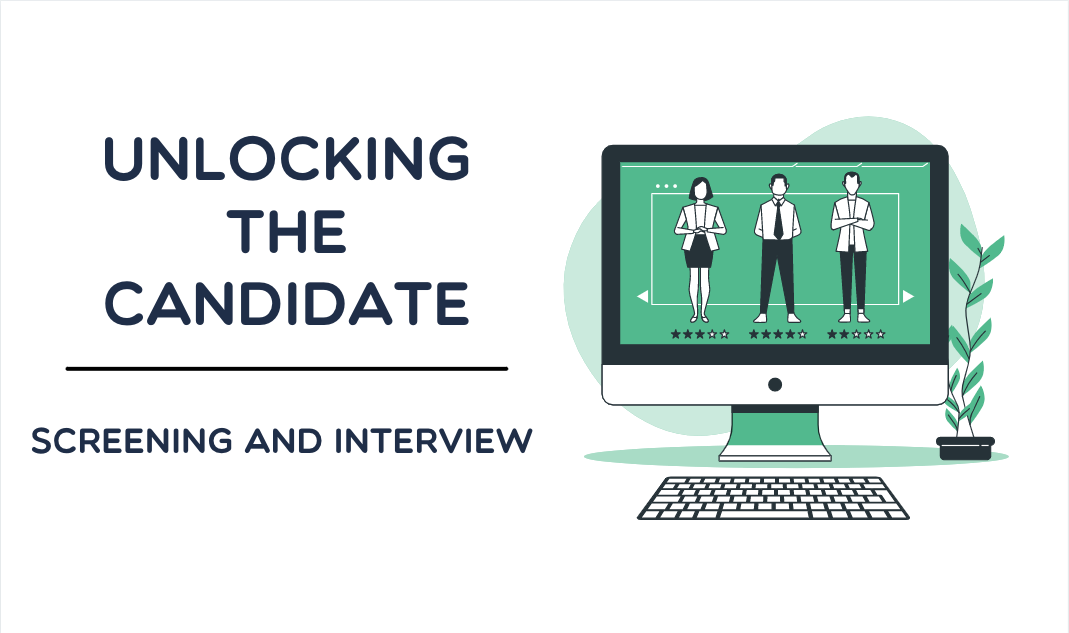Unlocking the Candidate – Screening and Interview
Right after the Resume, the human element.

In this article we consider 2 key aspects of a great hire. Along the journey of uncovering candidate insights, after screening through the resumes that come in, the next step is a screening call to the candidates, followed by an interview.
This ones a little longer, but we explore some important, overlooked themes.
Screening Call
In general, companies use these calls to identify a few quick things;
- Interest: Whether the candidate actually knows they applied or sprayed their CV all over the place.
- Communication: Would the candidate’s base level language proficiency, let them work well with their teammates?
- Confirmation: Confirming CV elements, legal residency requirements, other administrative questions.
- Conveying Information: That they’re being enrolled into the recruitment funnel and upcoming steps.
As the job is simple, it’s certainly not something a hiring manager takes on, often left in the able hands of the HR.
Although sometimes it's not even HR professionals but interns who end up with this responsibility. These interns tend to be students or fresh graduates that aren’t experienced enough or sufficiently trained to do this well. Their lack of skills and industry knowledge might ruin the experience for potential candidates.
There's got to be a better way!
How do we then get around this and give each candidate the attention they deserve?
Automation of a very human task isn’t what we’d usually recommend, but with rising smartness of tools in the market, automation may well be the answer.
Well, you’re aptly covered. There is great new, emerging technology with the promise of maintaining the candidate experience, while serving as both a knowledge repository for candidates, and getting the answers to the questions they need. The AI Chatbot.
While natural language processing isn’t just quite where it needs to be to satisfy the needs of 100% of candidates, a very high majority of situations allow for the usage of such a solution.
Now that we’ve got the basics screened, we've covered a candidate's interest, and whether they qualify for the role.
It’s time for the next step!
The Interview
The interview process is the most delicate of the whole journey. From our experience, this in particular is much like the company’s fingerprint, unique from any other. It speaks volumes about the culture of the company, the thought and care that went into developing their funnel, and how this directly affects their quality of hire.
But today we’re only looking at the overlooked. Those that we take for granted, and assume, infallible.
The Culture-Fit Fallacy
If you ask 400 companies what some of their key reasons behind why they conduct interviews (and we did!), you’ll find most companies, often try to discern the fabled “Culture-fit” through the interview process.
In this great article, “How to Hire” by Patty McCord, she discusses looking beyond the simplistic view of ‘culture fit’ traditionally used. It’s a term we’re very wary to use for the exact same reason.
In Patty's own words;
“What most people really mean when they say someone is a good fit culturally is that he or she is someone they’d like to have a beer with”
This isn't a completely poor measure, but only one aspect of what we consider, essentially the impression a person has on you.
“In truth, one company’s A player may be a B player for another firm. There is no formula for what makes people successful. Many of the people we let go from Netflix because they were not excelling at what we were doing went on to excel in other jobs.”
But that’s just the point. There’s so much more to culture-fit than any simple definition. It takes so much for even the most trained individual to be able to identify the things you need to know about a person, before you can make that call.
And, speaking of the most trained individuals:
The Mismatch
Nobody’s aced the recruitment process because, let’s face it, screening and assessment, isn’t an exact science. There’s too many variables when it comes to figuring out who the person sitting across the table (or screen) from you.
The assessment of a trained professional made over several years ought to be better than a hurried 30 minutes interview, right?
History tells us otherwise.
A couple of glaring examples, come borrowed from one of my favourite books Talking to Strangers by Malcolm Gladwell.
- Whether its Neville Chamberlain famously meeting with Hitler in an attempt to gauge the man, to stop the war before it broke out, not once, but 3 times, spending several hours with him in each instance. And returning triumphantly 'Having secured world peace' just months before World War II.
- If a man so distinguished, someone who earned his bread by influencing and arranging people couldn’t do it in a few hours, how can any of us?
One common solution, is relying on crowd wisdom. Democratising the interview process
But, to this end, the most common complaint from candidates is that there are far too many interviews in the recruitment pipeline. People tend to get bored or bogged down when they have to jump through so many hoops to land a job.
So, what’s next?
We need more data; interviewers need more data to do their job better. Are we stuck trying to put this information together on each candidate from sources we don't even know about? Is there any way out?
We certainly think so. Stay tuned.
